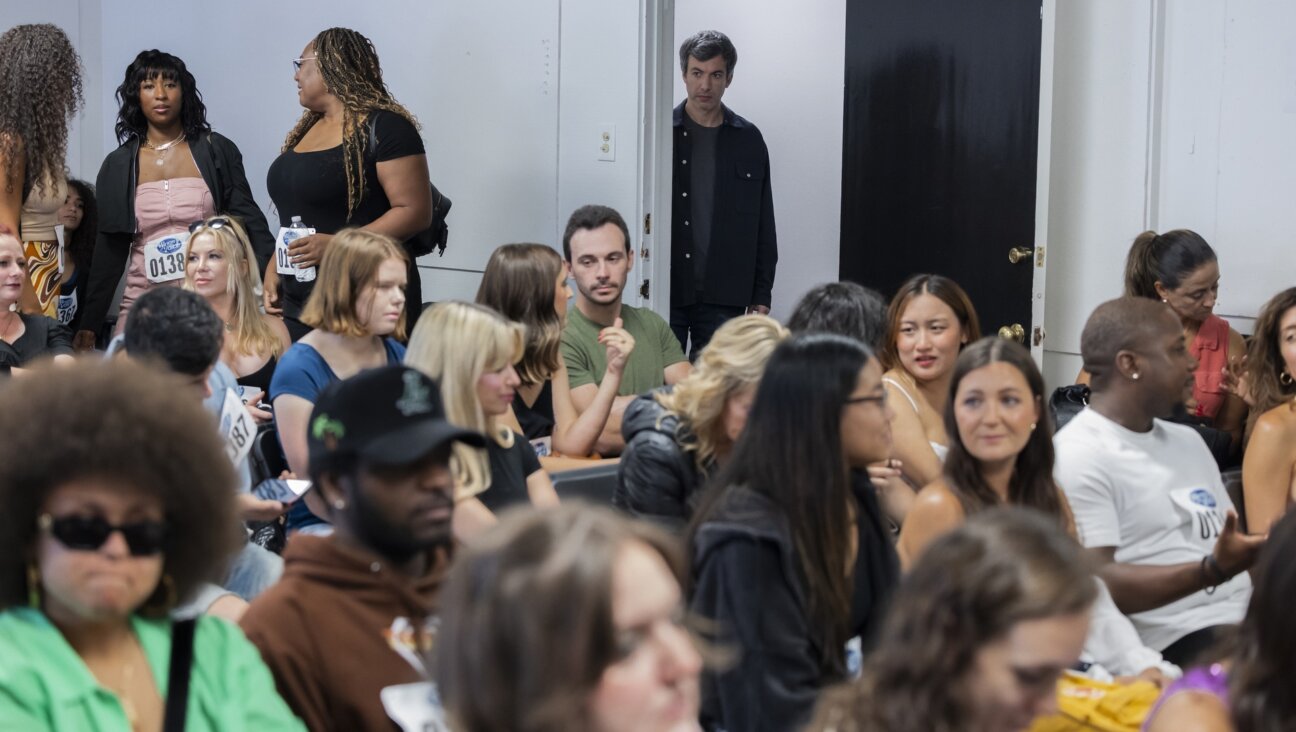Donors Give Pluralistic School in Boston $12.25 Mil


Lots of Ideas: Students in class at the Gann Accademy in sub- urban Boston, which just received a $12.25 million gift. Image by Tomer Gat
Defying the recession and concerns about Jewish philanthropy after Bernard Madoff, a group of anonymous donors recently gave $12.25 million to Gann Academy, a 13-year-old pluralistic Jewish high school in suburban Waltham, Mass., enabling the school to retire its building debt.
School officials will say only that the donors are several families, some not from Boston, who have an existing relationship with the school and who believe in Gann’s mission of “raising the next generation of Jewish leadership,” as development director Deborah Golden put it. “Our mission resonates with a lot of people, even if they are not moved to send students here,” Golden said.
The gift comes five years after a group of anonymous donors made a $45 million gift to Boston Jewish day schools. The anonymous nature of both gifts are unusual; 95% of the donors to educational institutions are acknowledged publicly, said Rae Goldsmith, vice president of the Council for Advancement and Support of Education.
“This feels like a huge vote of confidence that’s appropriate for our bar mitzvah year,” said Rabbi Marc Baker, Gann’s head of school. Baker hailed the donors for shunning the spotlight and aiming their philanthropy at the unglamorous target of debt retirement. “They understood this isn’t about them, and that’s amazing,” he said, adding, “After all, how do you name debt after somebody?”
Leaders in Jewish fundraising and education hailed the donors for departing from the norm of funding construction and academic projects, and for choosing to support education out of the many Jewish causes that are in need. Brandeis University historian Jonathan Sarna said: “Clearly the Jewish community, like many Americans individually, is too heavily leveraged, too deeply indebted to the banks. I hope that this gift becomes a ‘game changer’ in Jewish life and finds many imitators.”

Gann started with fewer than 50 freshmen and sophomores in 1997, in a small building at Brandeis. Originally, the school was given the name The New Jewish High School of Greater Boston and subsequently moved to a bank building in downtown Waltham, where it was housed for five years.
In 2003, the school borrowed $15 million in construction bonds to create the sprawling campus it now occupies. It changed its name to Gann after a $5-million gift from the late Joseph and Rae Gann.
The school has grown to 310 students in grades nine through 12, and now has a $10 million annual budget and annual tuition that is more than $27,000, not counting the cost of the junior-year term in Israel that most students pursue. The grant is not going to make an obvious impact on many students, Baker said, because it is going to add only $220,000 a year to the operating budget, since that was the amount in the budget dedicated to paying off the debt. But to be debt-free is a huge relief, he said.
“Rather than spending in excess of $750,000 a year in debt-service payments, the school can now utilize those available revenues to increase financial aid, enhance programs, attract top administrators and faculty, and improve and expand the physical plant, and build the necessary reserves,” said Elizabeth Jick, board president and managing director of Zions Bank.
The gift comes at a time of concern that the recession might reverse the consistent growth in Jewish day school enrollment. Over the past decade, Jewish day school enrollment grew by 25% to 228, 175, according to a study by the Avi Chai Foundation. But most of that growth was in Orthodox schools; enrollment in non-Orthodox schools increased by 5% in the first half of the decade, but dropped 2.5% over the past five years. The number of community day schools, the fastest-growing non-Orthodox segment, nearly doubled over the decade to 120 from 58, according to Marc Kramer, executive director of RAVSAK, an association of community schools.
Gann leaders and fans of pluralistic Jewish education see the gift as a sign of a broader trend of support for nondenominational education, which encourages the acceptance of differences and active engagement around those differences. As Baker said, in the old model, “we look at what we have in common. Here, we look to create dialogue and educate through discomfort about how we are different.”
That’s certainly the way some students see their school. Hillel Lehmann, a senior whose father was the founding head of school, started a debate club and a radio station and has enjoyed the way the faculty and administration encourage initiative. “I can grow as a person, and Gann has given me the necessary tools so I can develop my own identity,” Lehmann said.
Ezra Samet, a 2001 graduate and current Gann board member, said that the rigorous academics and vigorous discussions at Gann made for a seamless transition to his freshman year at Columbia University. “There is buy-in between the faculty and students [that] I’ve never seen anywhere else; it’s much more than a series of classes. It really draws kids and families into the community.”
Donald Sylvan, president of the Jewish Education Service of North America, cautioned against interpreting the Gann gift as a trend. “What we have here is a wonderful specific gift to a wonderful pluralistic day school.”
Nevertheless, Sylvan acknowledged that with the Gann gift, three of the four donations of more than $10 million to Jewish day schools in recent years went to pluralistic schools. Those include $25 million in 2007 to found the Adelson Upper School, a private Jewish high school in Las Vegas, while another pluralistic school, the Charles E. Smith Jewish Day School in Rockville, Md., received $15 million in 2005. The Raymond and Ruth Perelman Jewish Day School in Wynnewood, Pa., which is linked to the Conservative movement, received $20 million in 2001. The $45 million gift to Boston schools in 2004 was divided up among Jewish day schools in the city.
Rabbi Joshua Elkin of the Partnership for Excellence in Jewish Education, a day school organization, said that the Gann gift sends a strong message not only about pluralistic education, but also about support for Jewish education.
“Gifts like this,” Elkin said, “come because donors believe in the mission.”
Contact Judy Rakowsky at [email protected]
The Forward is free to read, but it isn’t free to produce

I hope you appreciated this article. Before you go, I’d like to ask you to please support the Forward.
Now more than ever, American Jews need independent news they can trust, with reporting driven by truth, not ideology. We serve you, not any ideological agenda.
At a time when other newsrooms are closing or cutting back, the Forward has removed its paywall and invested additional resources to report on the ground from Israel and around the U.S. on the impact of the war, rising antisemitism and polarized discourse.
This is a great time to support independent Jewish journalism you rely on. Make a Passover gift today!
— Rachel Fishman Feddersen, Publisher and CEO
Most Popular
- 1

Opinion My Jewish moms group ousted me because I work for J Street. Is this what communal life has come to?
- 2

Fast Forward Suspected arsonist intended to beat Gov. Josh Shapiro with a sledgehammer, investigators say
- 3

Politics Meet America’s potential first Jewish second family: Josh Shapiro, Lori, and their 4 kids
- 4

Fast Forward How Coke’s Passover recipe sparked an antisemitic conspiracy theory
In Case You Missed It
-

Film & TV In ‘The Rehearsal’ season 2, is Nathan Fielder serious?
-

Fast Forward Pro-Israel groups called for Mohsen Mahdawi’s deportation. He was arrested at a citizenship interview.
-

News Student protesters being deported are not ‘martyrs and heroes,’ says former antisemitism envoy
-

Opinion This Nazi-era story shows why Trump won’t fix a terrifying deportation mistake
-
Shop the Forward Store
100% of profits support our journalism
Republish This Story
Please read before republishing
We’re happy to make this story available to republish for free, unless it originated with JTA, Haaretz or another publication (as indicated on the article) and as long as you follow our guidelines.
You must comply with the following:
- Credit the Forward
- Retain our pixel
- Preserve our canonical link in Google search
- Add a noindex tag in Google search
See our full guidelines for more information, and this guide for detail about canonical URLs.
To republish, copy the HTML by clicking on the yellow button to the right; it includes our tracking pixel, all paragraph styles and hyperlinks, the author byline and credit to the Forward. It does not include images; to avoid copyright violations, you must add them manually, following our guidelines. Please email us at [email protected], subject line “republish,” with any questions or to let us know what stories you’re picking up.















